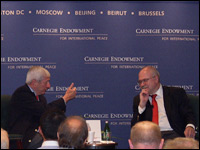Registration
You will receive an email confirming your registration.
IMGXYZ783IMGZYXIn a wide-ranging discussion with renowned journalist Marvin Kalb, Dmitri Trenin provided analysis into the current state of Russian politics and civil society. He argued that Russia should not be seen as a failed democracy, but rather as an evolving authoritarian capitalist society whose transition to transparent and representative government will happen, but will take generations.
Russia, Dr. Trenin said, is ruled by the people who own it. It is a nation of consumers, not citizens. He humorously pointed to what he called the "Ikea Index," noting the widespread appearance in Russia of stores catering to the burgeoning middle class. Yet he suggested that as Russians grow wealthier and enjoy an ever better quality of life, their emerging interests will eventually require their participation in the political process.
Economic growth and consumerism do not necessarily translate into Russia's Westernization, he said, especially if by "Westernization" one refers to the model of the European Union. Dr. Trenin pointed to what he said was the dark side of the current political and economic regime in Russia: very few people protest human rights abuses, the society is atomized, and there is no sense of social solidarity.
At the same time, he said, bearing in mind the fact that the Russian people consciously chose to reject the Soviet system, there is potential for democratic change as well as the certainty that totalitarianism of the kind practiced by the USSR will never return to Russia.
Questions focused on the extent to which Russia's revitalization was confined to its major urban centers, the demographic problem and the reemergence of Slavophilism, the sources of anti-Americanism in Russia, and the future of Russian nationalism.
In response, Dr. Trenin elaborated his views that Russia has ceased to be an empire for all time and that it would no longer seek to undertake a universalist mission. The proportion of ethnic Russians to minorities will remain high, he said, even if the birth rates are lower. At the same time, there are real problems with regard to migration and the rise of xenophobia which the Russian government is not sufficiently addressing. At some levels, there are those who find it politically expedient to use xenophobia as a populist tool.
With regard to Russian nationalism, Dr. Trenin noted that Russia's nation-building project is still under way and that a growth in nationalist sentiment was the downside of the transition. He noted that young Russians today are being taught a version of history that the older generation would never accept, particularly with respect to the glory and strength of the Soviet Union. A myth is being propagated that the central, overriding objective of U.S. foreign policy is to be an obstacle and do harm to Russia and keep it from attaining its rightful place in the international arena.
